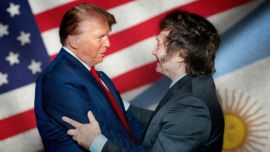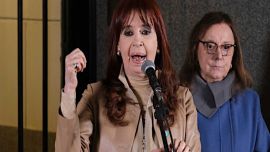Uruguay has applauded Argentina for shifting its stance on the Mercosur trade bloc, praising indications from Buenos Aires that it is willing to make its position more flexible.
In a statement issued by Argentina’s Foreign Ministry, the nation’s top diplomat Diana Mondino said President Javier Milei’s government is open to “new negotiation modalities” that will allow member states to “advance in agreements with other countries and blocs.”
Uruguayan Foreign Minister Omar Paganini reacted positively to the remarks. “We are taking steps towards greater openness,” he told reporters in Montevideo.
Paganini, the head of Uruguay's foreign service, highlighted Mondino had put Buenos Aires' change of position in writing at a meeting on Monday in the Uruguayan capital, which was also attended by his counterparts from the other Mercosur partners: Mauro Vieira of Brazil, Rubén Ramírez of Paraguay and Celinda Sosa of Bolivia.
“In recent years, Mercosur has not been able to become an instrument for access to large external markets, in addition to a Common External Tariff, which is high by international standards. Argentina therefore proposes that those members of the bloc willing to open new markets be allowed to start negotiations on an individual or plurilateral basis,” said Mondino, which said “environmental protection must not become an excuse for trade protectionism.”
“Our intention is that if during a period of time [two meetings of the Common Market Group, Mercosur's executive body] no understanding is reached to negotiate jointly, negotiations can begin under this third modality, and the agreements that are signed will be open to accession by the other member states,” she said in a statement.
Uruguay, which holds the pro-tempore presidency of Mercosur until the end of the year, hopes that the search for flexibility – which clashes with Brazil's historic stance – will prosper.
“Of course, we also have to get the other partners to be more flexible. But at the same time, we all agree more than before to be more active in international business,” Paganini stressed.
Uruguayan President Luis Lacalle Pou has insisted that Mercosur sign a free-trade agreement with China, and even initiated bilateral talks with Beijing separately. This has caused tensions in the bloc, which has not yet managed to close its long-delayed agreement with the European Union (EU) that it has been negotiating since 1999.
“Hopefully now there will be a green light. The expectations are moderate,” Paganini said of the resumption of talks with the EU this week in Brasilia.
Agreed in 2019 but long stalled, the EU-Mercosur pact envisages eliminating most tariffs between the two zones to create a trading area of 700 million consumers.
But there is resistance from some European countries, notably France, whose agricultural sector fears South American competition.
– TIMES/AFP























Comments